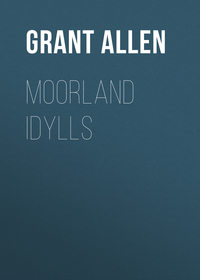 полная версия
полная версияPhilistia

Grant Allen
Philistia
CHAPTER I
CHILDREN OF LIGHT
It was Sunday evening, and on Sundays Max Schurz, the chief of the London Socialists, always held his weekly receptions. That night his cosmopolitan refugee friends were all at liberty; his French disciples could pour in from the little lanes and courts in Soho, where, since the Commune, they had plied their peaceful trades as engravers, picture-framers, artists'-colourmen, models, pointers, and so forth—for most of them were hangers-on in one way or another of the artistic world; his German adherents could stroll round, pipe in mouth, from their printing-houses, their ham-and-beef shops, or their naturalists' chambers, where they stuffed birds or set up exotic butterflies in little cabinets—for most of them were more or less literary or scientific in their pursuits; and his few English sympathisers, chiefly dissatisfied philosophical Radicals of the upper classes, could drop in casually for a chat and a smoke, on their way home from the churches to which they had been dutifully escorting their un-emancipated wives and sisters. Max Schurz kept open house for all on Sunday evenings, and there was not a drawing-room in London better filled than his with the very advanced and not undistinguished set who alone had the much-prized entrée of his exclusive salon.
The salon itself did not form any component part of Max Schurz's own private residence in any way. The great Socialist, the man whose mandates shook the thrones of Russia and Austria, whose movements spread terror in Paris and Berlin, whose dictates were even obeyed in Kerry and in Chicago, occupied for his own use two small rooms at the top of a shabby composite tenement in a doubtful district of Marylebone. The little parlour where he carried on his trade of a microscope-lens grinder would not have sufficed to hold one-tenth of the eager half-washed crowd that pressed itself enthusiastically upon him every Sunday. But a large room on the ground floor of the tenement, opening towards the main street, was used during the week by one of his French refugee friends as a dancing-saloon; and in this room on every Sunday evening the uncrowned king of the proletariate Socialists was permitted to hold his royal levees. Thither all that was best and truest in the socially rebellions classes domiciled in London used to make its way; and there men calmly talked over the ultimate chances of social revolutions which would have made the hair of respectable Philistine Marylebone stand stiffly on end, had it only known the rank political heresies that were quietly hatching in its unconscious midst.
While Max Schurz's hall was rapidly filling with the polyglot crowd of democratic solidarists, Ernest Le Breton and his brother were waiting in the chilly little drawing-room at Epsilon Terrace, Bayswater, for the expected arrival of Harry Oswald. Ernest had promised to introduce Oswald to Max Schurz's reception; and it was now past eight o'clock, getting rather a late hour for those simple-minded, early-rising Communists. 'I'm afraid, Herbert,' said Ernest to his brother, 'he forgets that Max is a working-man who has to be at his trade again punctually by seven o'clock to-morrow. He thinks he's going out to a regular society At Home, where ten o'clock's considered just the beginning of the evening. Max won't at all like his turning up so late; it smells of non-productivity.'
'If Herr Schurz wants to convert the world,' Herbert answered chillily, rolling himself a tiny cigarette, 'he must convince the unproductive as well as the proletariate before he can set things fairly on the roll for better arrangement. The proletariate's all very well in its way, no doubt, but the unproductive happen to hold the key of the situation. One convert like you or me is worth a thousand ignorant East-end labourers, with nothing but their hands and their votes to count upon.'
'But you are not a convert, Herbert.'
'I didn't say I was. I'm a critic. There's no necessity to throw oneself open-armed into the embrace of either party. The wise man can wait and watch the progress of the game, backing the winner for the time being at all the critical moments, and hedging if necessary when the chances turn momentarily against the favourite. There's a ring at the bell: that's Oswald; let's go down to the door to meet him.'
Ernest ran down the stairs rapidly, as was his wont; Herbert followed in a more leisurely fashion, still rolling the cigarette between his delicate finger and thumb. 'Goodness gracious, Oswald!' Ernest exclaimed as his friend stepped in, 'why, you've actually come in evening dress! A white tie and all! What on earth will Max say? He'll be perfectly scandalised at such a shocking and unprecedented outrage. This will never do; you must dissemble somehow or other.'
Oswald laughed. 'I had no idea,' he said, 'Herr Schurz was such a truculent sans-culotte as that comes to. As it was an evening reception I thought, of course, one ought to turn up in evening clothes.'
'Evening clothes! My dear fellow, how on earth do you suppose a set of poor Leicester Square outlaws are going to get themselves correctly set up in black broadcloth coats and trousers? They might wash their white ties themselves, to be sure; they mostly do their own washing, I believe, in their own basins.' ('And not much at that either,' put in Herbert, parenthetically.) 'But as to evening clothes, why, they'd as soon think of arraying themselves for dinner in full court dress as of putting on an obscurantist swallow-tail. It's the badge of a class, a distinct aristocratic outrage; we must alter it at once, I assure you, Oswald.'
'At any rate,' said Oswald laughing, 'I've had the pleasure of finding myself accused for the first time in the course of my existence of being aristocratic. It's quite worth while going to Max Schurz's once in one's life, if it were only for the sake of that single new sensation.'
'Well, my dear fellow, we must rectify you, anyhow, before you go. Let me see; luckily you've got your dust-coat on, and you needn't take that off; it'll do splendidly to hide your coat and waistcoat. I'll lend you a blue tie, which will at once transform your upper man entirely. But you show the cloven hoof below; the trousers will surely betray you. They're absolutely inadmissible under any circumstances whatsoever, as the Court Circular says, and you must positively wear a coloured pair of Herbert's instead of them. Run upstairs quickly, there's a good fellow, and get rid of the mark of the Beast as fast as you can.'
Oswald did as he was told without demur, and in about a minute more presented himself again, with the mark of the Beast certainly most effectually obliterated, at least so far as outer appearance went. His blue tie, light dust-coat, and borrowed grey trousers, made up an ensemble much more like an omnibus conductor out for a holiday than a gentleman of the period in correct evening dress. 'Now mind,' Ernest said seriously, as he opened the door, 'whatever you do, Oswald, if you stew to death for it—and Schurz's rooms are often very close and hot, I can assure you—don't for heaven's sake go and unbutton your dust-coat. If you do they'll see at once you're a wolf in sheep's clothing, and I shouldn't be at all surprised if they were to turn and rend you. At least, I'm sure Max would be very much annoyed with me for unsocially introducing a plutocratic traitor into the bosom of the fold.'
They walked along briskly in the direction of Marylebone, and stopped at last at a dull, yellow-washed house, which bore on its door a very dingy brass plate, inscribed in red letters, 'M. et Mdlle. Tirard. Salon de Danse.' Ernest opened the door without ringing, and turned down the passage towards the salon. 'Remember,' he said, turning to Harry Oswald by way of a last warning, with his hand on the inner door-handle, 'coûte que coûte, my dear fellow, don't on any account open your dust-coat. No anti-social opinions; and please bear in mind that Max is, in his own way, a potentate.'
The big hall, badly lighted by a few contribution candles (for the whole colony subscribed to the best of its ability for the support of the weekly entertainment), was all alive with eager figures and the mingled busy hum of earnest conversation. A few chairs ranged round the wall were mostly occupied by Mdlle. Tirard and the other ladies of the Socialist party; but the mass of the guests were men, and they were almost all smoking, in utter indifference to the scanty presence of the fair sex. Not that they were intentionally rude or boorish; that they never were; except where an emperor or an aristocrat is concerned, there is no being on earth more courteous, kindly, and considerate for the feelings of others than your exiled Socialist. He has suffered much himself in his own time, and so miseris succurrere discit. Emperors he mentally classes with cobras, tarantulas, and scorpions, as outside the pale of humanitarian sympathies altogether; but, with this slight political exception, he is the broadest and tenderest and most catholic in his feelings of all living breathing creatures. However, the ladies of his party have all been brought up from their childhood onward in a mingled atmosphere of smoke and democracy; so that he no more thinks of abstaining from tobacco in their presence than he thinks of commiserating the poor fish for being so dreadfully wet, or the unfortunate mole for his unpleasantly slimy diet of live earthworms.
'Herr Schurz,' said Ernest, singling out the great leader in the gloom immediately, 'I've brought my brother Herbert here, whom you know already, to see you, as well as another Oxford friend of mind, Mr. Harry Oswald, Fellow and Lecturer of Oriel. He's almost one of us at heart, I'm happy to say, and at any rate I'm sure you'll be glad to make his acquaintance.'
The little spare wizened-up grey man, in the threadbare brown velveteen jacket, who stood in the middle of the hall, caught Ernest's hand warmly, and held it for a moment fettered in his iron grip. There was an honesty in that grip and in those hazy blue-spectacled eyes that nobody could for a second misunderstand. If an emperor had been introduced to Max Schurz he might have felt a little abashed one minute at the old Socialist's royal disdain, but he could not have failed to say to himself as he looked at him from head to foot, 'Here, at least, is a true man.' So Harry Oswald felt, as the spare grey thinker took his hand in his, and grasped it firmly with a kindly pressure, but less friendly than that with which he had greeted his known admirer, Ernest Le Breton. As for Herbert, he merely bowed to him politely from a little distance; and Herbert, who had picked up at once with a Polish exile in a corner, returned the bow frigidly without coming up to the host himself at all for a moment's welcome.
'I'm always pleased to meet friends of the cause from Oxford,' Herr Schurz said, in almost perfect English. 'We want recruits most of all among the thinking classes. If we are ever to make headway against the banded monopolies—against the place-holders, the land-grabbers, the labour-taxers, the robbers of the poor—we must first secure the perfect undivided confidence of the brain-workers, the thinkers, and the writers. At present everything is against us; we are but a little leaven, trying vainly in our helpless fashion to leaven the whole lump. The capitalist journals carry off all the writing talent in the world; they are timid, as capital must always be; they tremble for their tens of thousands a year, and their vast circulations among the propertied classes. We cannot get at the heart of the people, save by the Archimedean lever of the thinking world. For that reason, my dear Le Breton, I am always glad to muster here your Oxford neophytes.'
'And yet, Herr Schurz,' said Ernest gently, 'you know we must not after all despair. Look at the history of your own people! When the cause of Jehovah seemed most hopeless, there were still seven thousand left in Israel who had not bowed the knee to Baal. We are gaining strength every day, while they are losing it.'
'Ah yes, my friend. I know that too,' the old man answered, with a solemn shake of the head; 'but the wheels move slowly, they move slowly—very surely, but oh, so slowly. You are young, friend Ernest, and I am growing old. You look forward to the future with hope; I look back to the past with regret: so many years gone, so little, so very little done. It will come, it will come as surely as the next glacial period, but I shall not live to see it. I stand like Moses on Pisgah; I see the promised land before me; I look down upon the equally allotted vineyards, and the glebe flowing with milk and honey in the distance; but I shall not lead you into it; I shall not even lead you against the Canaanites; another than I must lead you in. But I am an old man, Mr. Oswald, an old man now, and I am talking all about myself—an anti-social trick we have inherited from our fathers. What is your friend's special line at Oxford, did you say, Ernest?'
'Oswald is a mathematician, sir,' said Ernest, 'perhaps the greatest mathematician among the younger men in the whole University.'
'Ah! that is well. We want exact science. We want clear and definite thinking. Biologists and physicists and mathematicians, those are our best recruits, you may depend upon it. We need logic, not mere gas. Our French friends and our Irish friends—I have nothing in the world to say against them; they are useful men, ardent men, full of fire, full of enthusiasm, ready to do and dare anything—but they lack ballast. You can't take the kingdom of heaven by storm. The social revolution is not to be accomplished by violence, it is not even to be carried by the most vivid eloquence; the victory will be in the end to the clearest brain and the subtlest intellect. The orthodox political economists are clever sophists; they mask and confuse the truth very speciously; we must have keen eyes and sharp noses to spy out and scent out their tortuous fallacies. I'm glad you're a mathematician, Mr. Oswald. And so you have thought on social problems?'
'I have read "Gold and the Proletariate,"' Oswald answered modestly, 'and I learned much from it, and thought more. I won't say you have quite converted me, Herr Schurz, but you have given me plenty of food for future reflection.'
'That is well, said the old man, passing one skinny brown hand gently up and down over the other. 'That is well. There's no hurry. Don't make up your mind too fast. Don't jump at conclusions. It's intellectual dishonesty to do that. Wait till you have convinced yourself. Spell out your problems slowly; they are not easy ones; try to see how the present complex system works; try to probe its inequalities and injustices; try to compare it with the ideal commonwealth: and you'll find the light in the end, you'll find the light.'
As he spoke, Herbert Le Breton lounged up quietly from his farther corner towards the little group. 'Ah, your brother, Ernest!' said Max Schurz, drawing himself up a little more stiffly; 'he has found the light already, I believe, but he neglects it; still he is not with us, and he that is not with us is against us. You hold aloof always, Mr. Herbert, is it not so?'
'Well, not quite aloof, Herr Schurz, I'm certain, but not on your side exactly either. I like to look on and hold the balance evenly, not to throw my own weight too lightly into either stale. The objective attitude of the mere spectator is after all the right one for an impartial philosopher to take up.'
'Ah, Mr. Herbert, this philosophy of your Oxford contemplative Radicals is only another name for a kind of social selfishness, I fancy,' said the old man solemnly. 'It seems to me your head is with us, but your heart, your heart is elsewhere.'
Herbert Le Breton played a moment quietly with the Roman aureus of Domitian on his watch-chain; then he said slowly in his clear cold voice, 'There may be something in that, no doubt, Herr Schurz, for each of us has his own game to play, and while the world remains unreformed, he must play it on his own gambit to a great extent, without reference to the independent game of others. We all agree that the board is too full of counters, and as each counter is not responsible for its own presence and position on the board, having been put there without previous consultation by the players, we must each do the best we can for ourselves in our own fashion. My sympathies, as you say, are on your side, but perhaps my interests lie the other way, and after all, till you start your millennium, we must all rattle along as well as we can in the box together, jarring against one another in our old ugly round of competition, and supply and demand, and survival of the fittest, and mutual accommodation, and all the rest of it, to the end of the chapter. Every man for himself and God for us all, you know. You have the logic, to be sure, Herr Schurz, but the monopolists have the law and the money.'
'Ah, yes,' said the old Socialist grimly; 'Demas, Demas; he and his silver mine; you remember your Bunyan, don't you? Well, all faiths and systems have their Demases. The cares of this world and the deceitfulness of riches. He's bursar of his college, isn't he, Ernest? I thought so. "He had the bag, and bare what was put therein." A dangerous office, isn't it, Mr. Oswald? A very dangerous office. You can't touch pitch or property without being defiled.'
'You at least, sir, said Ernest, reverentially, 'have kept yourself unspotted from the world.'
The old man sighed, and turned for a moment to speak in French to a tall, big-bearded new-comer who advanced to meet him. 'Impossible!' he said quickly; 'I am truly distressed to hear it. It is very imprudent, very unnecessary.'
'What is the news?' asked Ernest, also in French.
The new-comer answered him with a marked South Russian accent. 'There has been another attempt on the life of Alexander Nicolaiovitch.'
'You don't mean to say so!' cried Ernest in surprise.
'Yes, I do,' replied the Russian, 'and it has nearly succeeded too.'
'An attempt on whom?' asked Oswald, who was new to the peculiar vocabulary of the Socialists, and not particularly accustomed to following spoken French.
'On Alexander Nicolaiovitch,' answered the red-bearded stranger.
'Not the Czar?' Oswald inquired of Ernest.
'Yes, the one whom you call Czar,' said the stranger, quickly, in tolerable English. The confusion of tongues seemed to be treated as a small matter at Max Schurz's receptions, for everybody appeared to speak all languages at once, in the true spirit of solidarity, as though Babel had never been.
Oswald did not attempt to conceal a slight gesture of horror. The tall Russian looked down upon him commiseratingly. 'He is of the Few?' he asked of Ernest, that being the slang of the initiated for a member of the aristocratic and capitalist oligarchy.
'Not exactly,' Ernest answered with a smile; 'but he has not entirely learned the way we here regard these penal measures. His sympathies are one-sided as to Alexander, no doubt. He thinks merely of the hunted, wretched life the man bears about with him, and he forgets poor bleeding, groaning, down-trodden, long-suffering Russia. It is the common way of Englishmen. They do not realise Siberia and Poland and the Third Section, and all the rest of it; they think only of Alexander as of the benevolent despot who freed the serf and befriended the Bulgarian. They never remember that they have all the freedom and privileges themselves which you poor Russians ask for in vain; they do not bear in mind that he has only to sign his name to a constitution, a very little constitution, and he might walk abroad as light-hearted in St. Petersburg to-morrow as you and I walk in Regent Street to-day. We are mostly lopsided, we English, but you must bear with us in our obliquity; we have had freedom ourselves so long that we hardly know how to make due allowance for those unfortunate folks who are still in search of it.'
'If you had an Alexander yourselves for half a day,' the Russian said fiercely, turning to Oswald, 'you would soon see the difference. You would forget your virtuous indignation against Nihilist assassins in the white heat of your anger against unendurable tyranny. You had a King Charles in England once—the mere shadow of a Russian Czar—and you were not so very ceremonious with him, you order-loving English, after all.'
'It is a foolish thing, Borodinsky,' said Max Schurz, looking up from the long telegram the other had handed him, 'and I told Toroloff as much a fortnight ago, when he spoke to me about the matter. You can do no good by these constant attacks, and you only rouse the minds of the oligarchy against you by your importunity. Bloodshed will avail us nothing; the world cannot be regenerated by a baptism like that. Every peasant won over, every student enrolled, every mother engaged to feed her little ones on the gospel of Socialism together with her own milk, is worth a thousand times more to us and to the people than a dead Czar. If your friends had really blown him up, what then? You would have had another Czar, and another Third Section, and another reign of terror, and another raid and massacre; and we should have lost twenty good men from our poor little side for ever. We must not waste the salt of the earth in that reckless fashion. Besides, I don't like this dynamite. It's a bad argument, it smacks too much of the old royal and repressive method. You know the motto Louis Quatorze used to cast on his bronze cannon—"Ultima ratio regum." Well, we Socialists ought to be able to find better logic for our opponents than that, oughtn't we?'
'But in Russia,' cried the bearded man hotly, 'in poor stricken-down groaning Russia, what other argument have they left us? Are we to be hunted to death without real law or trial, tortured into sham confessions, deluded with mock pardons, arraigned before hypocritical tribunals, ensnared by all the chicanery, and lying, and treachery, and ferreting of the false bureaucracy, with its spies, and its bloodhounds, and its knout-bearing police-agents; and then are we not to make war the only way we can—open war, mind you, with fair declaration, and due formalities, and proper warning beforehand—against the irresponsible autocrat and his wire-pulled office-puppets who kill us off mercilessly? You are too hard upon us, Herr Schurz; even you yourself have no sympathy at all for unhappy Russia.'
The old man looked up at him tenderly and regretfully. 'My poor Borodinsky,' he said in a gentle tremulous voice, 'I have indeed sympathy and pity in abundance for you. I do not blame you; you will have enough and to spare to do that, even here in free England; I would not say a harsh word against you or your terrible methods for all the world. You have been hard-driven, and you stand at bay like tigers. But I think you are going to work the wrong way, not using your energies to the best possible advantage for the proletariate. What we have really got to do is to gain over every man, woman, and child of the working-classes individually, and to array on our side all the learning and intellect and economical science of the thinking classes individually; and then we can present such a grand united front to the banded monopolists that for very shame they will not dare to gainsay us. Indeed, if it comes to that, we can leave them quietly alone, till for pure hunger they will come and beg our assistance. When we have enticed away all the workmen from their masters to our co-operative factories, the masters may keep their rusty empty mills and looms and engines to themselves as long as they like, but they must come to us in the end, and ask us to give them the bread they used to refuse us. For my part, I would kill no man and rob no man; but I would let no man kill or rob another either.'
'And how about Alexander Nicolaiovitch, then?' persisted the Russian, eagerly. 'Has he killed none in his loathsome prisons and in his Siberian quicksilver mines? Has he robbed none of their own hardly got earnings by his poisoned vodki and his autocratically imposed taxes and imposts? Who gave him an absolute hereditary right to put us to death, to throw us in prison, to take our money from us against our will and without our leave, to treat us as if we existed, body and soul, and wives and children, only as chattels for the greater glory of his own orthodox imperial majesty? If we may justly slay the highway robber who meets us, arms in hand, in the outskirts of the city, and demands of us our money or our life, may we not justly slay Alexander Nicolaiovitch, who comes to our homes in the person of his tax-gatherers to take the bread out of our children's mouths and to help himself to whatever he chooses by the divine right of his Romanoff heirship? I tell you, Herr Max, we may blamelessly lie in wait for him wherever we find him, and whoso says us nay is siding with the wolf against the lambs, with the robber and the slayer against the honest representative of right and justice.'









